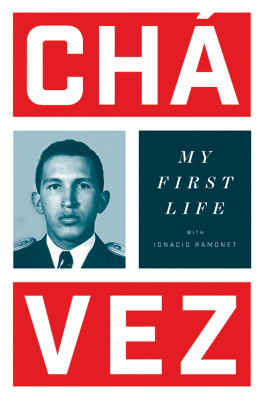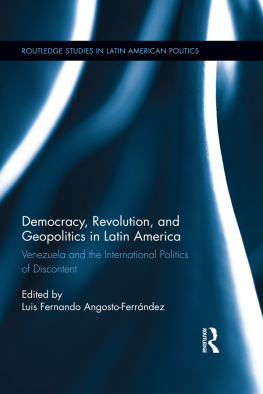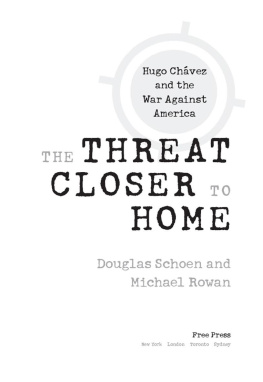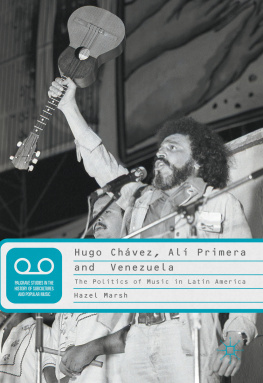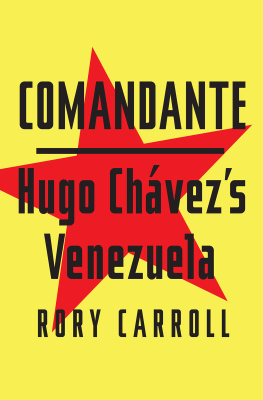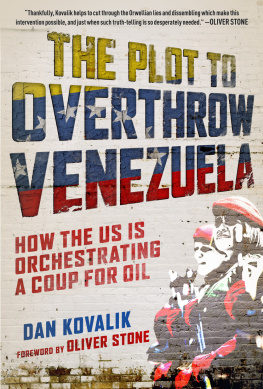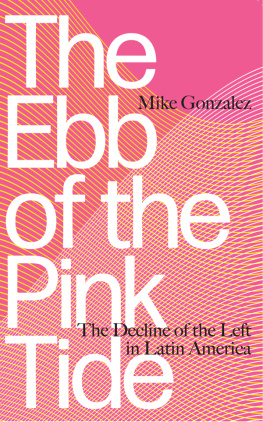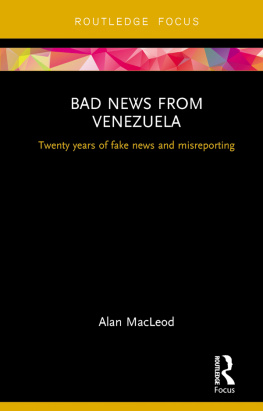MY FIRST LIFE
Conversations with Ignacio Ramonet
Hugo Chvez
Translated by Ann Wright

This book was translated with the support of Mmoire des luttes

This English-language edition published by Verso 2016
Originally published in Spanish as Mi primera vida
Penguin Random House Spain 2013
Translation Ann Wright 2016
All rights reserved
The moral rights of the authors have been asserted
1 3 5 7 9 10 8 6 4 2
Verso
UK: 6 Meard Street, London W1F 0EG
US: 20 Jay Street, Suite 1010, Brooklyn, NY 11201
versobooks.com
Verso is the imprint of New Left Books
ISBN-13: 978-1-78478-383-9 (HB)
ISBN-13: 978-1-78478-385-3 (UK EBK)
ISBN-13: 978-1-78478-386-0 (US EBK)
British Library Cataloguing in Publication Data
A catalogue record for this book is available from the British Library
Library of Congress Cataloging-in-Publication Data
Names: Chavez Frias, Hugo, interviewee. | Ramonet, Ignacio, interviewer. |
Wright, Ann, 1943 translator.
Title: My first life : conversations with Ignacio Ramonet / Hugo Chavez ; translated by Ann Wright.
Other titles: Mi primera vida. English
Description: Brooklyn, NY : Verso Books, [2016]
Identifiers: LCCN 2016011444 | ISBN 9781784783839 (hardback : alk. paper) Subjects: LCSH: Chavez Frias, Hugo Interviews. |
Presidents Venezuela Interviews. | Presidents Venezuela Biography. | Venezuela Politics and government 19741999.
Classification: LCC F2329.22.C54 A5 2016 | DDC 987.06/42092 dc23 LC record available at http://lccn.loc.gov/2016011444
Typeset in Adobe Garamond Pro by Hewer Text UK, Ltd, Edinburgh
Printed in the US by Maple Press
To Maximilien Arveliz
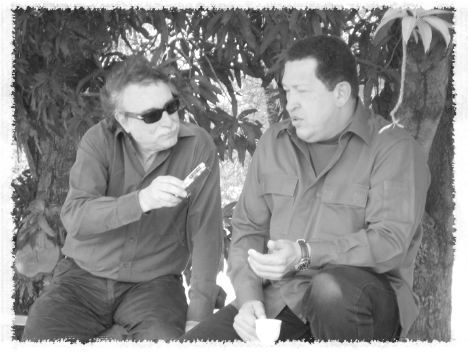
Contents
We had arrived the previous evening at a house somewhere in the middle of the Llanos, the seemingly endless central plains of Venezuela. It was nine in the morning and already baking hot. The house had been lent by a friend and was a simple, rustic, one-storey building typical of the Llanos. It had a tiled roof and at the front a wide, open veranda, furnished with low wrought-iron tables, wicker rocking chairs and dozens of lush potted plants. All around, the hard cracked earth was dotted with bright shrubs, some grandiose tall trees, and others laden with blossom. A tenacious breeze stirred up a golden, perfumed dust but, punished by these burning gusts, the surrounding vegetation appeared limp and exhausted.
In a shady part of the garden, a table had been prepared for the interview with documents and books. While I waited for Hugo Chvez, I sat on a wooden fence surrounding the ranch, or hato as they are called in Venezuela. The silence was broken only by bird-song, the odd cock crowing, and the distant throb of a generator.
There were no buildings in sight, no noise of traffic. It was an ideal retreat. No Wi-Fi, not even a mobile phone connection, only a few satellite phones, via a military network, for the bodyguards and the president himself.
The previous afternoon, the Falcon light aircraft in which we were travelling had landed at the small airport of Barinas. Before starting our conversations for this book, Chvez wanted to show me the land of his childhood, the roots of his destiny. The setting that made me what I am, he said.
He had arrived almost incognito to avoid protocol and ceremony: simply dressed in trainers, black jeans, white shirt and a lightweight blue military-style jacket, accompanied only by Maximilien Arveliz, his brilliant young foreign affairs adviser, and several bodyguards in olive-green uniforms. At the foot of the aircraft steps, the Saharan heat and two discreet black 4x4s were waiting for us. Chvez got behind the wheel of the first jeep. Maximilien and I jumped in beside him, while the bodyguards boarded the one behind. Night was beginning to fall. We set off for the historic centre of Barinas.
A low, ramshackle city, Barinas had the feel of a frontier town. It was full of battered pick-up trucks and the spanking 4x4s of the new rich. The men all wore wide-brimmed hats and leather boots. The Llanos is cowboy country, a land of adventure, mythical exploits, contraband, rodeos and wide open spaces. And of corridos and joropos, the typical ballads and dances of the plains, their own unique country music. Seen from Caracas, this is still very much the Wild West, and the heartland of Venezuelan identity.
Barinas, capital of the state of the same name, has mushroomed in recent years. We were surrounded by frantic activity: construction sites, cranes, road works, gridlock On the outskirts, the architectural style of downright ugliness had wreaked havoc, as in so many other cities, but as we approached the old urban centre, the geometric colonial harmony and the odd impressive historic building reappeared.
In his beautiful calm baritone voice, Chvez recounted the history of the city. He showed me where the Liberator, Simon Bolvar, had passed; where the plainsmen of Pez the Centaur had crossed; where Ezequiel Zamora the general of free men liberated Barinas, proclaimed the Federation and left for the decisive battle of Santa Ins on 10 December 1859. We must connect the present with the past. Our history is our identity. If you dont know it, you dont know who you are. Only history makes a people aware of itself.
Suddenly the phone peeped. It was a text message from Fidel Castro congratulating him on that afternoons speech. He showed me: 21h 30. I was listening to you. I thought it was very good. Congratulations. Youre taking a gamble. It was terrific. Youre brilliant. He made no comment, but I could see he was happy. He had a deep affection for Fidel.
We reached the historic centre. It was already dark and the city was not well lit, but we saw the striking Palacio del Marqus and the enormous old prison. That was followed by a tour of Chvezs own personal geography. He showed me his old secondary school the Liceo OLeary and the art academy where he had studied painting; where he had lived as a teenager on the Rodrguez Domnguez estate, and where his friends the Ruiz Guevara family had lived; the local baseball pitch; the house of his first girlfriend. I used to walk along this avenue with Nancy Colmenares we called this bar The Faculty Radio Barinas was in this building I did my first radio broadcasts from here.
The dark night and the tinted car windows meant I could hardly see a thing. Whats more, in his nostalgic pilgrimage, Chvez was interweaving memories from the two different periods he had lived here: first during his secondary school years (19661971), then as a graduate fresh out of the Military Academy (19751977). I got somewhat lost in the labyrinth of his past experiences. He realized, and made a disarming apology: Forgive me, memories suddenly came flooding back. You know how memories ambush you at every bend in the road. He patiently started again, reorganizing the chronology.
The son of schoolteachers, Chvez was a natural pedagogue, who knew instinctively how to put himself on the level of the listener. He enjoyed explaining things clearly and deftly. He was never overbearing. He hated boring his audience. He wanted to be understood and tried hard to achieve it. Almost always, when he was with me, he carried a handful of coloured pencils and a notebook. With his left hand he was left-handed he would sketch, draw figures, jot down statistics, and explain concepts, ideas, numbers. He tried to make the abstract visible, and had the knack of simplifying quite complex problems.

